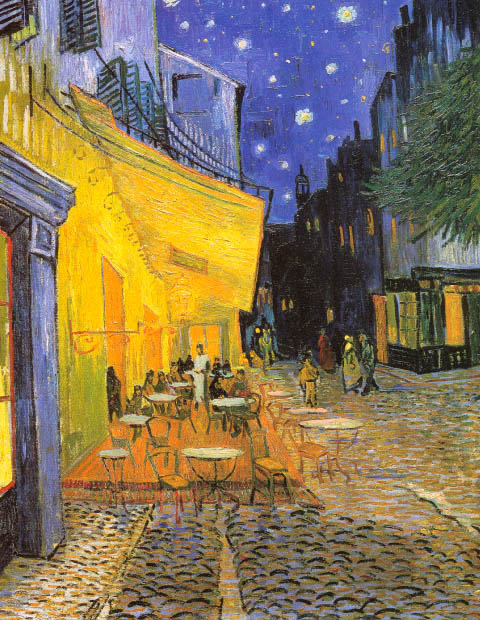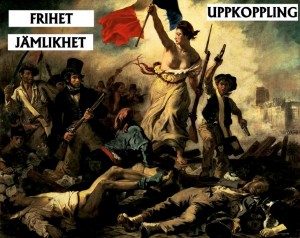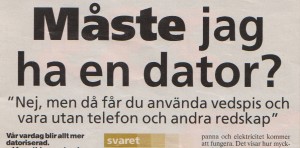VA hörde av sig, med anledning av att det gått drygt tjugo år (23 närmare bestämt) sedan jag drog i nödbromsen på X 2000 (“Operation Sköldpadda”).
Jag tillstår att jag gillar ungefärligheten i detta. Tre år och två månader efter “jubiléet”.
Som kontrast kan jag nämna att jag själv 2013 i samma ärende hörde av mig till SJ-s egen publikation Kupé — som jag ärligt tycker är mycket bra — tror det var någon vecka efter (eller om det var före?) själva “tjugoårsdagen”. Det var väl helt rätt tidning för ämnet? Men då var saken inte intressant, en sådan försening var inte acceptabel. (Att tågen inte håller tidtabellen… en helt annan sak.)
Det där med att nyheter kommer “för sent” är ju inte något som läsare, tittare och lyssnare bryr sig så hemskt mycket om, men vissa tidningsredaktörer har tyvärr fått för sig att Punktlighet är kung och att Nyheter Åldras i Progeritakt. Skönt då när Veckans Affärer bryter mot det mönstret.
Texten blev, som ofta händer, något kortad i VA. Här är hela oförkortade versionen. Som jag påpekade för Karl-Johan Byttner som kontaktade mig: bra frågor, de leder vidare.
Vart, ja, det är en annan fråga.
1. Du blev rikskändis när du drog i nödbromsen till ett X2000-tåg 1993 och delade ut flygblad till resenärerna där du menade att man måste fråga sig om ekvationen “snabbare är bättre” verkligen stämmer. Nu har det gått drygt 20 år sedan händelsen. Vart har samhället färdats under den tiden och vart är vi på väg som man brukar säga i SVT-programmet “På Spåret”?
I min bok “Offensiv nostalgi” från 1993 försökte jag identifiera och handgripligt protestera mot “tidens gudar”, till exempel snabbhet. Vad jag då inte förutsåg var den sanslösa IT-hysteri som skulle följa. IT utlästes informationsteknik, själv sa jag informationstyranni. Eller informationsteologi, halleluja! År 2000 utmanade jag Jonas Birgersson (som Veckans Affärer då jämförde med Jesus) på verbal duell. Samt skrev IT-psalmen “All you need is bredband“, hittas på nätet.
2. Vad kommer egentligen det här med att “snabbare är bättre” ifrån? Vem/vilka ligger bakom det och vad har det skapat i samhället, enligt din uppfattning?
En meme skapad av Illuminati? Eller så är det meningen att mänskligheten ska gå in i en superacceleration som är svindlande, smärtsam, men också utvecklande.
2. Jag har talat med stressexperten Anna Benich Karlstedt som är så stressad att inte hon får ihop sitt vanliga liv. Om hon som expert inte lyckas få ihop tillvaron hur ska vi vanliga dödliga lyckas med det?
Jag håller tummarna för Anna men läget behöver inte vara SÅ mörkt. Som någon sa: Det finns vissa saker man måste vara expert för att inte förstå.
3. Teknikutvecklingen kan tyckas paradoxal. Jag menar å ena sidan gör tekniken att vi kan utföra saker snabbare, men å andra sidan verkar mobiler, surfplattor och annat bara öka stressen i tillvaron och skapa ett samhälle där vi är ständigt uppkopplade. Håller du med om paradoxen och vad ska man göra åt den?
Vi gör saker 1) snabbare än förr men vi vill göra 2) SÅ MYCKET MER ön förr. Högre tempo, högre glupskhet, vi vill ha ALLT på julbordet! Är det då konstigt om man får existentiell paltkoma? Som kontrast har vi historien om den unga journalissan som besöker en hundraåring tant som bor i skogen. Blir det inte tråkigt här, undrar flickan. “Nej, varför det? Jag har ju katten och en lös tand!”
4. Håller vi på att stressa ihjäl oss i samhället – Anna Benich Karlstedt sade exempelvis att man inte ens får ha tråkigt på Långfredagen längre?
Detta är nästa paradox. Vissa har förstått att det är roligt att “ha tråkigt”. Dessa kloka får bli våra ljusgestalter som visar vägen framåt — till synes bakåt.
5. Vad ska vi göra för att stoppa den här utvecklingen – jag menar det är vi människor själva som skapar stressen i tillvaron och statistik från Försäkringskassan visar på en explosion när det gäller människor som är sjukskrivna på grund av stressrelaterade besvär?
Vem är “vi”? Frågan “Vad ska vi göra?” indikerar ATT man vill göra något. Men det finns för många aktörer som tjänar grovt på att folk uppdaterar sin Facebookstatus och är ständigt uppkopplade. (Inte On-Off utan On-On. Jag kallar det ONONI). Den enes stress, den andras miljard. Starka ekonomiska särintressen uppmuntrar stress. Om alla tyckte illa om den skulle vi sluta rusa.
6. Vad var det som hände på 90-talet när man började prata om att “snabbare är bättre” och folk började gå in i väggen? Vad ser du för likheter mellan det som hände då med det som sker nu?
De som svalde memen fick betala dyrt. 2016 känns inte så mycket “gå in i väggen” som “milt sluttande nerförsbacke” (vilket är en finurlig författares definition på vägen till helvetet).
7. Vad kan du skönja för eventuella positiva signaler som skulle kunna bromsa utvecklingen med den ökade stressen i samhället?
Alltför många aktörer tjänar på att fotfolket stressar, så jag ser inga tecken på kollektivt lugn. Däremot har individer fattat galoppen. “Missa inte tåget”, skrek man i slutet på millenniet. Men det krävs mod för att hoppa av tåget. Det hjälper att se att tåget var ett boskapståg och att vägen mot det påstådda paradiset var en VÄGG.
8. Hur gör du som filosof för att finna lugnet i tillvaron – vilka är dina bästa tips?
Ta motgiftet klassisk musik. Gå med i Sjundedagsnihilisterna. Öva aktiv nonchalans: att en stund varje dag helt ignorera, ja, fullständigt skita i informationsflödets lavaflod.
9. Tycker du att det är dags att dra i nödbromsen på nytt och har du någon ny klurig idé för att återigen kunna lyfta frågan om livshastigheten?
Är inte klurig längre, vill inte längre bromsa världen. Den vill ju inte det själv, så vem är jag att insistera? Ibland är krasch bästa medicin. Om väggen är så attraktiv, gå in i den och kom ut på andra sidan som filosof!













